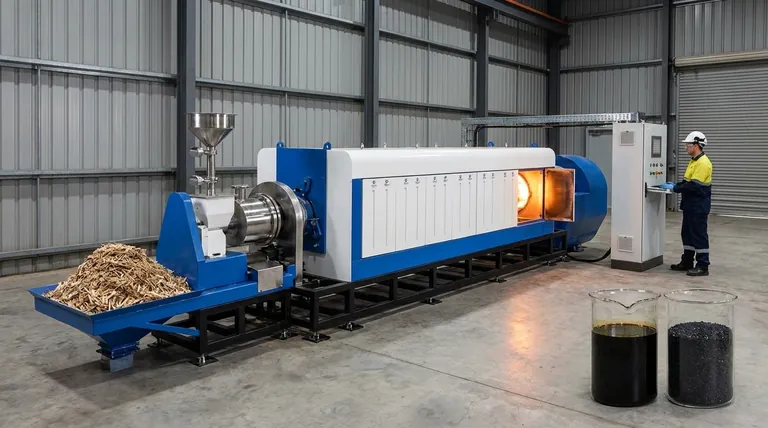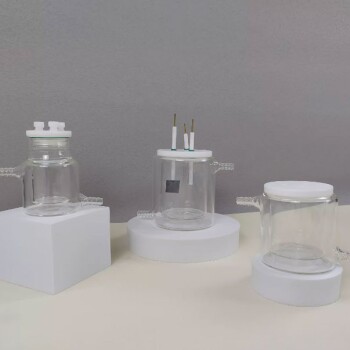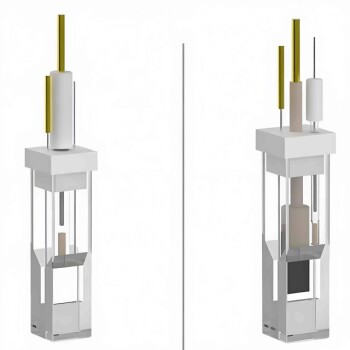At its core, a pyrolysis reactor is a powerful tool for transformation. It leverages high heat in an oxygen-starved environment to chemically decompose organic materials, converting what is often considered waste into valuable outputs. The primary advantages are twofold: it drastically reduces waste destined for landfills and creates valuable products like renewable fuels and biochar, providing a sustainable alternative to fossil fuels and virgin materials.
The true advantage of pyrolysis is not just its ability to convert waste to value, but its adaptability. The specific benefits you realize—from energy production to material recovery—depend entirely on matching the right type of reactor to your specific feedstock and goals.

The Fundamental Advantages of Pyrolysis Technology
Pyrolysis offers a compelling solution to interconnected environmental and economic challenges. Its benefits extend beyond simple waste disposal into the realms of energy generation and climate action.
From Waste Stream to Value Stream
Pyrolysis reactors excel at processing a wide range of organic materials that would otherwise end their life in a landfill. This includes agricultural residues, wood waste, municipal solid waste (MSW), plastics, and rubber.
Instead of being a liability, this waste is converted into valuable commodities. The process can generate bio-oils (a form of biofuel), synthesis gas (syngas), and biochar, creating a circular economy where waste becomes a resource.
A Pathway to Energy Independence
The biofuels produced through pyrolysis serve as a direct, renewable substitute for conventional fossil fuels. This reduces our dependence on finite, often imported, energy sources.
By creating clean energy from locally sourced waste, pyrolysis contributes to a more resilient and decentralized energy grid, while also mitigating the pollution associated with burning fossil fuels.
Significant Environmental and Climate Benefits
Compared to incineration or landfilling, pyrolysis has a superior environmental profile. It significantly reduces the volume of waste and can decrease net greenhouse gas emissions.
Furthermore, the production of biochar offers a powerful tool for carbon sequestration. When this stable, carbon-rich material is added to soil, it locks carbon away for centuries, actively removing it from the atmosphere and contributing to global carbon reduction efforts.
Matching the Reactor to the Mission: A Design Breakdown
Not all pyrolysis reactors are the same. Each design is optimized for different feedstocks and desired end products. Understanding these differences is key to leveraging the technology effectively.
For High Bio-Oil & Gas Yield: The Fluidized-Bed Reactor
This design is highly effective for increasing the yield of liquid bio-oils and combustible gases. It is particularly well-suited for processing uniform, particulate substrates like shredded woody biomass. Its efficiency makes it a common choice in the petroleum and chemical industries for thermal cracking processes.
For Difficult & Heterogeneous Materials: Auger & Ablative Reactors
The auger reactor (also known as a screw reactor) is ideal for handling challenging or mixed feedstocks. Its robust mechanical action can process materials that might jam other systems, but it primarily produces biochar and is less efficient at creating bio-oils.
The ablative reactor is uniquely capable of processing very large substrate particles. Heat is transferred by direct contact with a hot surface, which means it doesn't require a carrier gas and can perform fast pyrolysis to produce liquids.
For Operational Simplicity: Circulating & Vacuum Reactors
The circulating reactor and vacuum reactor designs can offer simpler operation by eliminating the need for external inputs like a catalyst or carrier gas.
A vacuum reactor works by lowering the pressure, which facilitates the removal of pyrolysis vapors to be condensed into bio-oil. A circulating reactor relies solely on the rate of heat supply from an external source, simplifying one aspect of process control.
Understanding the Trade-offs
While powerful, pyrolysis technology is not a universal solution. Every advantage comes with considerations, and success depends on acknowledging the inherent trade-offs in reactor design and operation.
The Product Yield Dilemma
There is no single reactor that maximizes all potential products simultaneously. A design optimized for high bio-oil yield, like a fluidized-bed reactor, will be less effective at producing high quantities of biochar.
Conversely, an auger reactor is a biochar powerhouse but a poor choice if your primary goal is liquid fuel. Your desired end product must be the primary factor guiding your reactor selection.
Feedstock Sensitivity
The physical and chemical nature of your input material (feedstock) is critical. A fluidized-bed reactor, for example, requires a consistent and relatively small particle size to function properly.
While an auger or ablative reactor can handle more diverse or larger materials, their efficiency may vary depending on the feedstock's composition and moisture content. Pre-processing, such as drying and grinding, is often a necessary operational step.
Operational Complexity and Cost
While some designs eliminate the need for a catalyst or carrier gas, this does not mean they are simple. Vacuum systems require robust seals and pumps, while high-temperature systems demand significant energy input and specialized materials. The capital and operational costs must be weighed against the value of the products being created.
How to Select the Right Pyrolysis Approach
Your choice of reactor technology should be a direct reflection of your project's specific goals. Use your intended outcome as the starting point for your decision.
- If your primary focus is maximizing liquid biofuel from uniform biomass: A fast pyrolysis process in a fluidized-bed reactor is likely your most effective choice.
- If your primary focus is processing diverse or difficult municipal waste into stable biochar for carbon sequestration: An auger reactor is designed specifically for this purpose and offers robust material handling.
- If your primary focus is processing large-particle waste like wood chunks or shredded tires with rapid heating: An ablative reactor provides a unique advantage by avoiding the need for extensive pre-grinding or carrier gases.
- If your primary focus is operational simplicity by avoiding catalysts or carrier gases: A vacuum or circulating bed reactor may be suitable, provided the feedstock and desired output align with their capabilities.
Ultimately, harnessing the full potential of pyrolysis begins with a clear understanding of your feedstock and your desired end product.
Summary Table:
| Reactor Type | Best For Feedstock | Primary Output | Key Advantage |
|---|---|---|---|
| Fluidized-Bed | Uniform, small-particle biomass | High bio-oil & gas yield | Efficient for liquid fuel production |
| Auger (Screw) | Mixed, difficult materials (e.g., MSW) | High biochar yield | Robust handling of diverse waste |
| Ablative | Large particles (e.g., wood chunks) | Bio-oil | Fast pyrolysis without carrier gas |
| Vacuum/Circulating | Various, depending on design | Bio-oil | Simpler operation (no catalyst/gas) |
Ready to harness the power of pyrolysis for your specific waste stream and goals?
At KINTEK, we specialize in advanced laboratory equipment and pyrolysis solutions. Our experts can help you select the perfect reactor technology to maximize your output—whether your priority is renewable fuel production, efficient waste reduction, or carbon sequestration with biochar.
Contact our team today for a personalized consultation and discover how KINTEK can turn your waste management challenges into a sustainable value stream.
Visual Guide

Related Products
- Electric Rotary Kiln Small Rotary Furnace Biomass Pyrolysis Plant
- Customizable High Pressure Reactors for Advanced Scientific and Industrial Applications
- High Pressure Laboratory Autoclave Reactor for Hydrothermal Synthesis
- Mini SS High Pressure Autoclave Reactor for Laboratory Use
- Stainless High Pressure Autoclave Reactor Laboratory Pressure Reactor
People Also Ask
- What advantages do hydrothermal reactors provide in the synthesis of mesoporous hydroxyapatite-supported molybdenum catalysts?
- What are the technical advantages of using stainless steel tubular reactors for the continuous flow acetalization?
- What conditions does a hydrothermal reactor provide for HA catalysts? Optimize Mesoporous Hydroxyapatite Synthesis
- Why must photocatalytic CO2 reduction use a closed glass reactor with quartz? Ensure Precision and High Light Efficiency
- What is the function of a PTFE-lined stainless steel autoclave in hydrothermal experiments? Achieve Chemical Purity
- What role does a high-temperature and high-pressure reactor play in CoFe2O4/Fe synthesis? Unlock Core-Shell Precision
- Why is a nitrogen displacement step required in supercritical water hydrolysis? Ensure Pure Hydrolysis Yields
- What are the advantages of stirred tank reactors? Achieve Unmatched Process Control and Uniformity



















